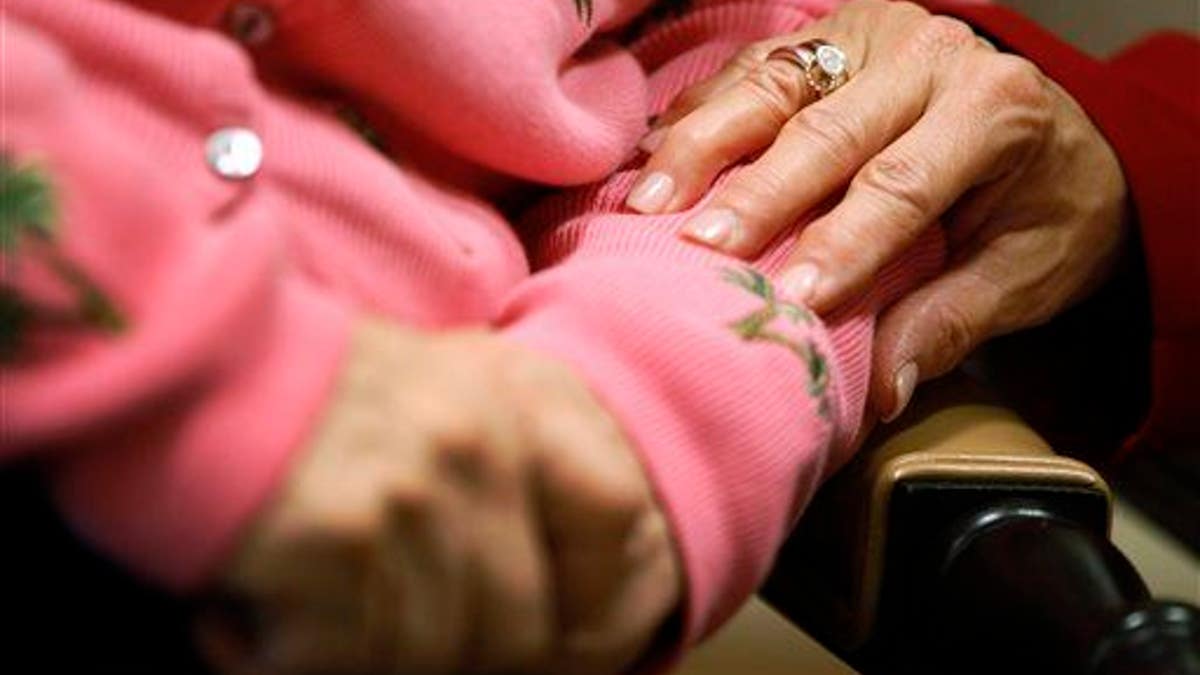
In this Feb. 6, 2012, file photo, a worker at an Alzheimer's assisted-living site puts her hand on the arm of a resident. (AP Photo/Charles Dharapak, File)
There is no test that can predict if a person with dementia is safe to drive, a new report suggests.
Tests that look at many cognitive skills instead of just one may be most helpful, however, according to researchers who reviewed findings in this area.
People with dementia have up to eight times the odds of being in a car accident compared with other seniors. But in the early stages of the condition, people with a dementia diagnosis can often drive safely, the study team writes in the Journal of The American Geriatrics Society.
"Simply having a diagnosis of dementia does not mean that the individual should have to give up their license, however due to the progressive nature of the disease, they will eventually need to stop driving," lead author Joanne Bennett, a doctoral candidate at Macquarie University in Sydney, Australia, told Reuters Health by email.
"As a result, their driving will need to be constantly monitored and reviewed by both loved ones and health professionals," Bennett said.
Dementia is an incurable condition that can be caused by various diseases, the most common being Alzheimer's disease. Dementia affects memory and other thinking skills and can impact motor functions necessary for driving.
To determine how well cognitive tests predict driving ability, Bennett and her colleagues analyzed data from 28 studies examining cognitive tests and driving performance among people with dementia.
Half of the studies used on-road tests to determine driving ability. Most of the rest relied on reports from caregivers.
The cognitive tests tended to focus on attention and concentration, ability to see objects, memory, language and general mental status. Some tests also looked at executive functioning, a measure of reasoning and problem-solving.
Overall, the links between tests of a single cognitive function and driving ability were inconsistent. The researchers found that single cognitive tests predicted the driving ability of people with dementia only 46 percent of the time.
People who performed badly on tests of mental status, executive functioning and attention and concentration also did poorly on driving tests just over half of the time.
The other cognitive skills were linked to safe driving less than half of the time, with memory and language proving to be least relevant to driving skills.
In contrast, in six studies researchers incorporated multiple tests to measure a variety of cognitive skills. Such batteries of tests consistently predicted whether or not a person was able to drive safely.
But only two of these studies offered cutoff scores that a doctor might be able use to determine if a patient can safely drive, the researchers note.
"As it stands, apart from on-road tests, which can be quite expensive for the client, there is no consensus on an objective assessment that can be used as an alternative," Bennett said.
Her team is working to develop a collection of tests that could assess the safety of drivers with dementia, she said.
"With an aging population, we will have an increasing number of drivers who have cognitive impairment and dementia," said Kaarin Anstey, Director of the Center for Research on Ageing, Health and Wellbeing in Australia.
"There are red flags that show when adults are unsafe to drive," Antsey, who was not involved in the study, said by email.
Eye impairments are common in dementia, and can result in people being unable to read signs or see pedestrians, she noted.
"Lack of orientation (e.g. driving up the wrong side of the road or inability to maintain lane position) are key indicators that driving has deteriorated to a point when it is unsafe," Antsey added.
Bennett said that forgetting how to locate familiar places, failing to observe traffic signs, making slow or poor decisions in traffic and driving at an inappropriate speed may also be important warning signs.
"When monitoring driving performance, loved ones should be looking for patterns of poor performance, and not basing their decisions on 'one off' events," Bennett advised.